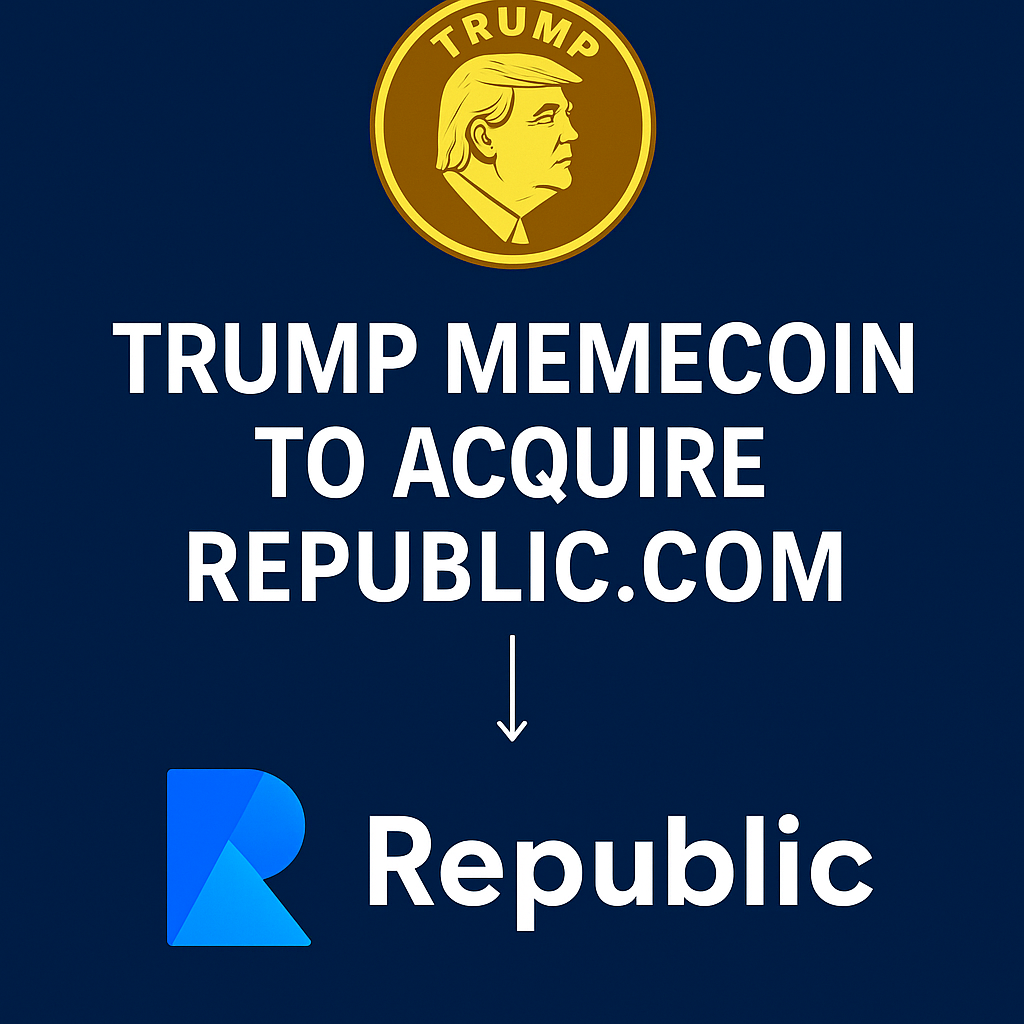Trump memecoin’s rumored bid for Republic.com sparks debate over compliance, investor protection, and the future of crowdfunding trust.
A development rippling across both the crypto and crowdfunding industries this week highlights just how blurry the line between speculative token projects and regulated finance has become.
According to a report on CryptoRank.io, the issuer behind the controversial TRUMP memecoin, Fight Fight Fight LLC, is in advanced discussions to acquire Republic.com’s U.S. operations. Republic, one of the leading investment crowdfunding platforms in the United States, has helped thousands of startups raise compliant capital under Reg CF, Reg A+, and Reg D exemptions. The rumored acquisition has set off a wave of debate, not just in crypto circles, but within the broader regulated crowdfunding ecosystem about ethics, brand integrity, and investor trust.
From Memes to Markets: The Unlikely Suitor
The TRUMP memecoin, launched earlier this year by an entity known as Fight Fight Fight LLC, is part of a surge of politically themed digital assets that trade more on sentiment and spectacle than on fundamentals. The token’s price has been volatile, with speculative traders and online influencers driving much of the action.
Republic.com, in contrast, built its reputation on transparency, compliance, and investor protection, becoming a trusted intermediary between startups and retail investors. It operates under U.S. securities law and has established itself as a responsible bridge between private companies and the investing public.
A potential link between a highly speculative memecoin issuer and a regulated crowdfunding platform raises fundamental questions: What happens when hype-driven communities collide with compliance-driven capital formation? Can the two coexist without eroding trust?
Crowdfunding Meets Crypto Chaos
At first glance, the deal may appear to be another step in the growing convergence between blockchain and equity crowdfunding. Crypto projects have increasingly turned to tokenized fundraising and community-based ownership models, areas where Republic itself has shown interest through its digital asset arm, Republic Crypto.
But this particular tie-up is of a very different nature. The TRUMP token, though legally structured as a meme asset, carries clear political baggage and operates in a space notorious for pump-and-dump schemes, opaque governance, and minimal accountability. If Republic’s U.S. business were to merge with such an issuer, brand integrity could be at stake, not just for Republic, but for the credibility of the broader regulated crowdfunding industry.
An Erosion of Trust?
Speaking with CF Watchdog, one industry observer put it bluntly:
“Republic.com has spent years cultivating a reputation as one of the few trusted, compliant, and professional crowdfunding platforms in the world. Associating that brand with anything carrying the Trump label, and especially a speculative memecoin, risks undoing a lot of that hard-earned trust. The reputational cost could far outweigh any short-term commercial benefit.”
That sentiment echoes what many in the crowdfunding sector are quietly expressing: that crowdfunding platforms live and die by credibility. Once a platform’s investor base doubts the integrity of its offerings, restoring confidence is extremely difficult.
Regulatory and Reputational Risks
If completed, the deal would likely invite scrutiny from the U.S. Securities and Exchange Commission (SEC) and FINRA, both of which oversee equity crowdfunding intermediaries. Questions would arise over how the acquirer’s token issuance practices align with securities-law obligations, anti-money-laundering rules, and disclosure standards.
There’s also the issue of political exposure. Platforms that rely on public trust and financial neutrality risk alienating parts of their investor base when linked to politically charged brands. For an organization like Republic which has prided itself on inclusive access to capital for diverse founders, such an association could appear inconsistent with its stated mission.
Moreover, the TRUMP memecoin community thrives on the volatility, personality-driven marketing, and online tribalism that run counter to the conservative fiduciary posture of regulated fundraising. Blending the two cultures could prove combustible.
Could Anything Positive Come of It?
There are theoretical upsides. If managed carefully, the deal might accelerate integration between blockchain technology and regulated investment frameworks, potentially paving the way for new models of tokenized equity or secondary trading.
Republic’s infrastructure, with investor verification, compliance, and escrow management, could, in theory, impose much-needed discipline on the wilder corners of crypto fundraising. In a best-case scenario, it might even inspire a new generation of hybrid offerings that merge community enthusiasm with regulatory safeguards.
But that optimistic view depends on strong governance and a commitment to investor protection. Without those guardrails, it risks becoming another episode in the long history of crypto hype cycles, this time with a regulated platform’s reputation on the line.
A Moment of Reflection for Crowdfunding
Whether or not the acquisition proceeds, this episode should serve as a wake-up call for the crowdfunding industry. The boundaries between crypto speculation, tokenized assets, and regulated investment crowdfunding are collapsing faster than most compliance frameworks can adapt.
Platforms that chase growth through high-volatility or politically charged associations may win short-term attention but lose long-term trust. In a market where investor confidence is the most valuable currency, credibility must outweigh clicks.
The reported TRUMP-Republic.com deal, if real, is a flashing warning sign of how fragile credibility can be in the new world of hybrid finance. A reputable platform built on compliance could be jeopardized by proximity to speculative branding and politicized assets.
The challenge for crowdfunding leaders is not just to embrace innovation but to protect the trust that makes innovation sustainable.
In the race to blend crypto with mainstream finance, the industry must remember that not all attention is good attention, and not all partnerships deserve applause.



